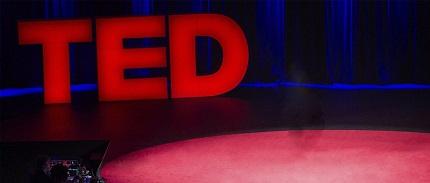 Es para mi ya una tradición navideña: recoger, el día 30 de Diciembre, el listado de las TED Talk que he visionado en el año.
Es para mi ya una tradición navideña: recoger, el día 30 de Diciembre, el listado de las TED Talk que he visionado en el año.Un visionado que se inició en Noviembre de 2011. El objetivo entonces era, principalmente, practicar inglés de una forma amena.
Hoy en día, sin renunciar del todo a ese objetivo, principalmente lo que busco en ese visionado es, explorar nuevas ideas en temas que me interesan (pero que no necesariamente tienen que ver con mi actividad profesional directa) y, por otro lado, visualizar cómo comunican y actúan los mejores speakers (una suerte de 'benchmarking' o de aprender en cabeza ajena).
Como ya llevo vistas más de 400 TED Talks, y a pesar del inmenso y creciente repositorio de vídeos existentes, cada vez me cuesta un poco más el seleccionar las siguientes charlas que voy a ver. En este año he recurrido, en la mayoría de los casos, simplemente a revisar y seleccionar las charlas que más me interesan de entre las que ofrece la web de TED sobre todo en los apartados de 'Trending' y 'Editor's Picks' y, de vez en cuando, la búsqueda de speakers concretos (en general, autores de libros que he leído y me han interesado).
Y este año, y utilizando para ello generalmente los Sábados, al final he visto 47 charlas, de temáticas variadas pero donde predominan las que tienen que ver con inteligencia artificial, neurociencia y robótica y un poquito de ciencia básica, especialmente física.
Estas son, en concreto, las TED Talks de este año.
- Vikram Sharma: How can quantum computing make encryption stronger
- Sandrine Thuret: You can grow new brain cells. Here is how
- Supasom Suwajanakom: Fake videos of real people - and how to spot them
- Sherry Turkle: Connected, but alone
- Will Jackson: Robots, AI and why the butler didn’t do it
- Toni Belpaeme: The power of a robot with a face
- Bruno Michel: How our brains will keep up with AI
- Phillip Gerbert: The basis of AI for business
- Dan Gibson: How to build sinthetic DNA and send it across the internet
- Yochai Benkler: The new open-source economics
- Genevieve Bell: 6 big ethical questions about the future of AI
- Mariano Sigman. Ypur words may predict your future mental health
- Hugh Herr: How we'll become cyborgs and extend human potential
- Ilona Stengel: The role of human emotions in science and research
- Helen Czerski: The fascinating physics of everyday life
- Lisa Bu: How books can open your mind
- Chip Kidd: Why books are here to stay
- Jessy Kate Schingler: Civilitation on the Moon and what it means for life on earth
- Janelle Shane: The danger of AI is weirder than you think
- Beth Ann Fennelly: How literature can help us develop empathy
- Refi Anadol: Art in the age of machine intelligence
- Richard Browning: How to build a jet suit
- Kate Darling: Why do we have an emotional connection to robots
- Tim Leberecht: 4 ways to build a human company in the age of machines
- Seth Shostak: ET is (probablly) out there - get ready
- Frans de Waal: Moral behavior in animals
- Jeremy Howard: The wonderful and terryfying impolications of computers that can learn
- Henry Evans & Chad Jenkins: Meet the robots for humanity
- Simon Sinek: How to discover your "why" in difficult times
- Chris Urmson: How a driverless car sees the world
- Lisa Genova: How your memory works and why forgetting is totally OK
- David Eagleman. Can we create new senses for humans?
- Jim Holt: Why does de universe exist?
- Rocío Lorenzo: How diversity makes teams more innovative
- Jocelyne Scott: The brain may be able to repir itself - with help
- Brian Green: Making sense of string theory
- Rebecca Kleibenger: Why don't yu like the sound of your own voice
- Suzanne Lee: Why 'biofabrication' is the next industrial revolution
- Recbecca Saxe: How we read each others minds
- Christopher deCharms: A look inside the brain in real time
- Vilayanur Ramachandran: 3 clues to understanding your brain
- Talithia Williams: Own your body's data
- Paul Knoepfler: The ethical dilemma of designer babies
- Tom Wujec: 3 ways the brain creates meaning
- Amanda Bennet: We need a heroic narrative for death
- Anne Lamott: 12 truths I learned from life and writing
- Alexander Mac Donald: How centuries of sci-fi sparked spaceflight
De cara al próximo año, ya tengo seleccionadas charlas para el primer trimestre, de momento con una temática bastante miscelánea. Y, Dios mediante, este Sábado 1 de Enero, veré mi primera charla de 2022.
Pero eso lo contaré ya dentro de un año.
Artículos de este blog relacionados
- Mis #TEDTalks de 2020
- Mis #TEDTalks de 2019
- Mis #TEDTalks de 2018
- Mis #TEDTalks de 2017
- Mis #TEDTalks de 2016
- Mis #TEDTalks de 2015
- Mis TED Talks de 2014
- 100 TED Talks a modo de regalo

